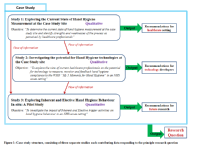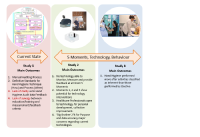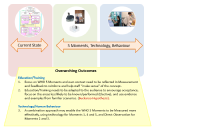My PhD Research
PhD Research
The focus of the PhD research was based upon understanding the existing burden of measuring hand hygiene compliance, and exploring opportunities for future improvement. This included evaluating how technology is currently being applied to the field (electronic monitoring systems), and questioning whether such applications are indeed "Fit-For-Purpose" in the eyes of the expert end-users (healthcare workers). Pilot work exploring the impact of clinical activity type on the likelihood of hand hygiene being performed provided potential "clues" for both technology developers and the infection prevention community as to how best to direct future measurement resources.
The principle Research Question addressed: What is the importance of Domain Knowledge and Human Behaviour for the development of successful Quality Audit Processes and (associated) Technologies?
The concept of domain knowledge was key to the research. It recognises that individuals experiencing a process are liable to possess tacit awareness and understanding of regulations (Hovenga et al., 2005).28 This awareness and understanding can be viewed as a valuable information source. Therefore, identifying those with roles within the process is seen as vital.
Design
A mixed-methods case study design was used to conduct the research, with three separate studies each contributing data towards answering the Research Question (see Figure below):
Each study had a specific objective, which was achieved through a number of individual research aims.
Each study addressed a key theme of the research:
Study 1: Exploring the current state of hand hygiene measurement at the case study site [Measurement]
A qualitative interview study involving 30 healthcare professionals, with supplementary participatory observation sessions (N=3), to create a visual "map" of the current measurement process.
Study 2: Investigating the potential for hand hygiene technologes at the case study site [Technology]
A qualitative interview study involving 20 healthcare professionals, discussing technology examples identified through two structured literature reviews.
Study 3: Exploring Inherent and Elective hand hygiene behaviour in-situ: a pilot study [Human Behaviour]
A quantitative observational study involving 20 healthcare professionals, exploring the effect of clinical activity type on the likelihood of performing hand hygiene.
Findings
The main findings for each study are summarised in the Figure below:
These findings can be combined to form specific outcomes, which provide recommendations to both technology developers and those with an interest in infection prevention (see Figure below):
Conclusions
The PhD research highlighted a need for future systems of measurement which produce meaningful data, but which incorporate potential benefits from the fields of both technology and behaviour.
As a future system of measurement the work proposes a modified Plan, Do, Study Act (PDSA) cycle to address closing the loop, highlighted as a major burden of the current process. The modified PDSA cycle also offers the potential to explore technology use, based around a WHO 5 Moment framework, therefore generating meaningful data.
Meaningful data produced is proposed as a foundation for education and training. This can take advantage of findings from behavioural research. A conceptual “split” of the WHO 5 Moments is offered, based on Inherent and Elective research. This may be useful in reducing healthcare professional apathy on the subject of hand hygiene.
Ultimately such process changes are proposed as a tool to assist with the continued aim of increasing hand hygiene and reducing and preventing healthcare associated infections.
For more information or to discuss the research findings, you are welcome to contact me: C.Dawson@warwick.ac.uk.




